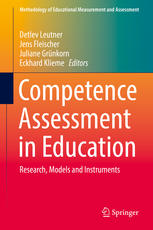

Most ebook files are in PDF format, so you can easily read them using various software such as Foxit Reader or directly on the Google Chrome browser.
Some ebook files are released by publishers in other formats such as .awz, .mobi, .epub, .fb2, etc. You may need to install specific software to read these formats on mobile/PC, such as Calibre.
Please read the tutorial at this link: https://ebookbell.com/faq
We offer FREE conversion to the popular formats you request; however, this may take some time. Therefore, right after payment, please email us, and we will try to provide the service as quickly as possible.
For some exceptional file formats or broken links (if any), please refrain from opening any disputes. Instead, email us first, and we will try to assist within a maximum of 6 hours.
EbookBell Team

4.4
62 reviewsThis book addresses challenges in the theoretically and empirically adequate assessment of competencies in educational settings. It presents the scientific projects of the priority program “Competence Models for Assessing Individual Learning Outcomes and Evaluating Educational Processes,” which focused on competence assessment across disciplines in Germany.
The six-year program coordinated 30 research projects involving experts from the fields of psychology, educational science, and subject-specific didactics. The main reference point for all projects is the concept of “competencies,” which are defined as “context-specific cognitive dispositions that are acquired and needed to successfully cope with certain situations or tasks in specific domains” (Koeppen et al., 2008, p. 62). The projects investigate different aspects of competence assessment: The primary focus lies on the development of cognitive models of competencies, complemented by the construction of psychometric models based on these theoretical models. In turn, the psychometric models constitute the basis for the construction of instruments for effectively measuring competencies.
The assessment of competencies plays a key role in optimizing educational processes and improving the effectiveness of educational systems. This book contributes to this challenging endeavor by meeting the need for more integrative, interdisciplinary research on the structure, levels, and development of competencies.